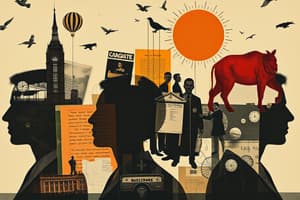Podcast
Questions and Answers
What is an organizational culture? What does an organizational culture include?
What is an organizational culture? What does an organizational culture include?
Organizational culture is the essence of organizational life. It includes what we can see an organization doing and what we also don't see as well.
Explain the cultural metaphor used by OCT theorists to explain culture.
Explain the cultural metaphor used by OCT theorists to explain culture.
Organizational culture indicates what constitutes the legitimate realm of inquiry. People are suspended in webs of significance and they construct the culture based on their interactions.
Discuss how the web analogy is relevant to our understanding of organization.
Discuss how the web analogy is relevant to our understanding of organization.
The web is spun by various individuals within the organization. Communication constructs culture and the web is the residue of this communication process.
List the assumptions of the cultural approach theory.
List the assumptions of the cultural approach theory.
How do members of an organization communicate their values?
How do members of an organization communicate their values?
List and explain the different symbols of an organization: the physical, behavioral, and verbal.
List and explain the different symbols of an organization: the physical, behavioral, and verbal.
Why are corporate stories, personal stories, and collegial stories important to an ethnographer studying an organizational culture?
Why are corporate stories, personal stories, and collegial stories important to an ethnographer studying an organizational culture?
What is ethnography?
What is ethnography?
What would you rely on to conduct an ethnographic study of an organization?
What would you rely on to conduct an ethnographic study of an organization?
What is performance? What is a ritual performance?
What is performance? What is a ritual performance?
Using an example, explain personal rituals, task rituals, social rituals, and organizational rituals.
Using an example, explain personal rituals, task rituals, social rituals, and organizational rituals.
Using an example of an organization, discuss passion performance, social performance, political performance, and enculturation performances.
Using an example of an organization, discuss passion performance, social performance, political performance, and enculturation performances.
What is the weakness/strength of OCT?
What is the weakness/strength of OCT?
Is OCT a grand/middle range, empirical/interpretive theory? Why?
Is OCT a grand/middle range, empirical/interpretive theory? Why?
Is OCT an intra/interpersonal communication theory? Organization theory? Small group communication theory?
Is OCT an intra/interpersonal communication theory? Organization theory? Small group communication theory?
Flashcards are hidden until you start studying
Study Notes
Organizational Culture Overview
- Organizational culture encompasses visible behaviors and underlying beliefs within a company.
- It defines the essence of organizational life, shaping how members interact and interpret their environment.
Cultural Metaphor in OCT
- Culture is viewed as a web of significance constructed by individuals within the organization.
- Represents the legitimate domain of inquiry where culture is fundamental to understanding organizational dynamics.
Web Analogy
- The web is actively created by individuals through communication, forming a framework that makes sense of their experiences.
- It serves as a residue of the communication processes that shape culture.
Assumptions of Cultural Approach Theory
- Organizational members forge a shared understanding of reality, enhancing comprehension of values.
- Symbol interpretation plays a critical role in defining culture.
- Cultural diversity exists, leading to varied interpretations of actions across organizations.
Communication of Values
- Values are expressed through stories and traditions shared among organizational members, reinforcing cultural identity.
Symbols in Organizational Culture
- Physical symbols: Disney characters at theme parks symbolize a family-friendly environment.
- Behavioral symbols: Employee conduct aligns with the organization’s upbeat image.
- Verbal symbols: Language and narratives that reflect the organization's ethos.
Importance of Stories in Ethnography
- Corporate, personal, and collegial stories provide insight into the organization’s culture and dynamics, enhancing understanding.
Ethnography Defined
- A qualitative method that explores cultural meanings through artifacts, stories, rituals, and practices.
Conducting Ethnographic Studies
- Insight gained through ethnography stems from participating in and observing members' experiences and perspectives.
Performance and Rituals
- Organizational life likened to a theatrical performance where roles and rituals are enacted regularly.
- Ritual performances are routine actions that reinforce culture in the workplace.
Types of Rituals
- Personal rituals: Daily routines specific to an individual.
- Task rituals: Activities related to specific job functions.
- Social rituals: Engagements that foster relationships among colleagues.
- Organizational rituals: Practices that reflect the organization's collective identity.
Performance Categories
- Passion performances involve sharing stories that express enthusiasm.
- Social performances highlight cooperative and courteous interactions.
- Political performances demonstrate power dynamics within the organization.
- Enculturation performances help new members understand organizational values and norms.
Strengths and Weaknesses of OCT
- Strength: Ethnographic research provides deep insights into organizational culture.
- Weakness: Logical inconsistencies may challenge the validity of interpretations.
Nature of OCT
- Classified as a middle-range theory due to its focus on specific aspects of communication rather than a comprehensive overview.
- Interpretive in nature, recognizing subjective interpretations of communication.
Type of Communication Theory
- OCT is characterized as an organizational theory, focusing on the complex dynamics within organizational structures.
Studying That Suits You
Use AI to generate personalized quizzes and flashcards to suit your learning preferences.




